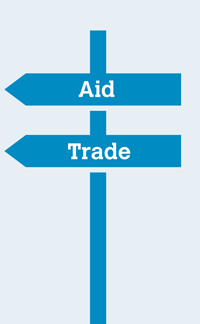6 The WTO can ... help countries develop
Underlying the WTO’s trading system is the fact that more open trade can boost economic growth and help countries develop. In that sense, commerce and development are good for each other.
In addition, the WTO agreements are full of provisions that take into account the interests of developing countries.
The WTO can ...
...cut living costs and raise living standards
...settle disputes and reduce trade tensions
...stimulate economic growth and employment
...cut the cost of doing business internationally
...encourage good governance
...help countries develop
...give the weak a stronger voice
...support the environment and health
...contribute to peace and stability
...be effective without hitting the headlines
Over three-quarters of WTO members are developing or least-developed countries. All of those in the queue to join are likewise developing countries. Whether the interests of developing countries are well enough served in the WTO is a subject of continuing debate. But even the most critical developing countries acknowledge that the system offers them benefits.
In fact, few economists dispute that properly handled, trade is essential for development.
All WTO agreements contain special provisions for developing countries, including longer periods to implement agreements and commitments, measures to increase their trading opportunities and support to help them build the infrastructure for WTO work, handle disputes, and implement technical standards. Least-developed countries receive special treatment, including exemption from many provisions.
The needs of developing countries can also be used to justify actions that might not normally be allowed under the agreements – for example, governments giving certain subsidies.
And the negotiations and other work launched at the Doha Ministerial Conference in November 2001 include numerous issues that developing countries want to pursue.
Finally, although the WTO is not an aid agency, it does have a role to play, particularly as a forum and clearing house for information on trade-related development aid.
Aid for Trade. The debate over whether developing countries need aid or trade is at an end.
Today, there is widespread recognition that developing countries need both. But WTO agreements do not guarantee increased trade flows: they provide opportunities. Some countries are better placed than others to grasp those opportunities. Some need help: “Aid for Trade” and various other tools are aimed at enhancing the capacity of developing countries to participate more effectively in the global marketplace.
The WTO is the coordinating agency for the Aid for Trade programme and as such regularly brings donors, development agencies, recipient governments and the private sector together. This dialogue helps to highlight what is being provided and what is needed while encouraging the development of more suitably designed projects.
Both donor and recipient countries have responded to these efforts. Donor countries have committed an average of $40 billion a year to trade-related development programmes while recipient countries have had success
in pinpointing the specific areas where aid is needed and in mainstreaming trade into their development strategies.
Better communications. The WTO has set up reference centres in over 100 trade ministries and regional organizations in capitals of developing and least-developed countries, providing computers and internet access to enable ministry officials to keep abreast of events in the WTO in Geneva through online access to the WTO’s immense database of official documents and other material. Efforts are also being made to help countries that do not have permanent representatives in Geneva.

“The WTO only cares about trade”
“Well, it is the World Trade Organization”
“But what about poverty and the environment?”
“What about them?”
“What’s the WTO doing to help the poor and protect the environment? The way I see it, trade makes the rich richer, and the poor poorer. And even worse, the WTO actually allows rich countries to pay huge subsidies to their farmers. So cheap tomatoes and wheat flood developing countries’ markets and put local farmers out of business.”
“But that’s what the WTO is trying to stop. If it were allowed to do its job properly, trade would help the poor to be fed. It would even fill in the gaps when there are local shortages. It would help poor farmers produce and sell more without having to compete with cheap subsidized produce. And the WTO is actually cutting those subsidies gradually. Without the WTO they could be much higher.”
“And what about WTO patent rules that allow big pharmaceutical companies to earn huge profits by making their medicines so expensive the poor can never buy them?”
“There’s plenty of room in the WTO rules on patents for governments to get medicines to the poor. But there are lots of other obstacles to overcome too. And we need incentives so that new medicines are invented.”
“I’m still not convinced.”
“Well, just imagine what it would be like with no world trade. How would developing countries get the food they need when they are hit by drought or floods? Like it or not, the world depends on trade and the WTO’s job is to make the rules as fair as possible for everyone.”

Developing
countries need
both aid and
trade